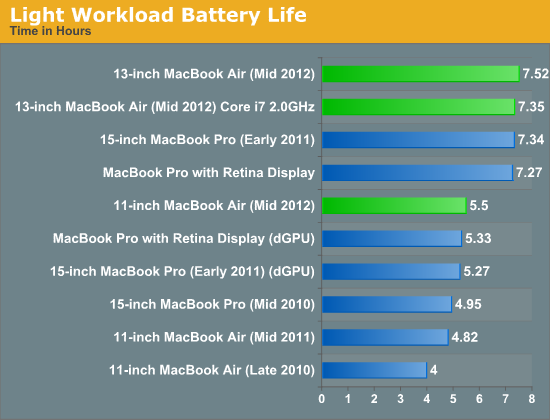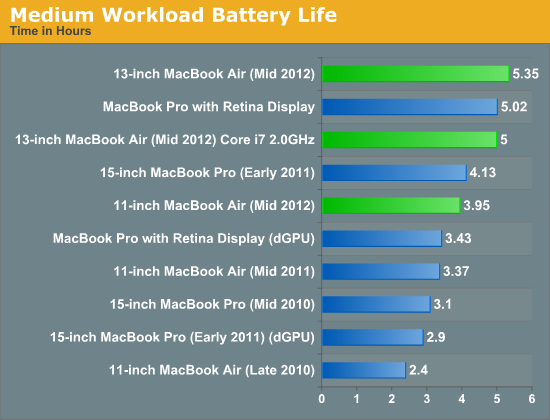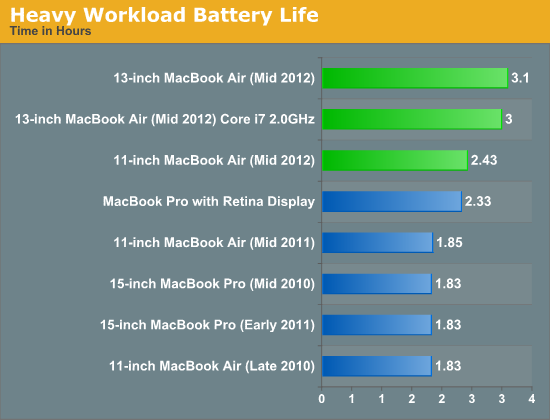The 2012 MacBook Air (11 & 13-inch) Review
by Anand Lal Shimpi on July 16, 2012 12:53 PM EST- Posted in
- Apple
- Mac
- MacBook Air
- Laptops
- Notebooks
Battery Life
The MacBook Air sees no increase in battery capacity over the previous generation, as a result any improvement in battery life boils down to what we get from Ivy Bridge. I'm stuck rebuilding the battery life results database from scratch now that I've built a new suite of tests for OS X. I've run all three generations of 11-inch MacBook Air through the new suite but I don't have numbers for the older 13-inch MBAs unfortunately. As I mentioned in the rMBP review, the new suite is designed to give accurate data points at three usage models: one light, one medium and one heavy. The combination of all three should give you an idea of the behavior of these systems on battery.
Across the board battery life of the 13-inch MacBook Air is actually quite similar to the Retina MacBook Pro, just from a much smaller battery and without the variability introduced by the rMBP's discrete GPU. If anything the lack of a discrete GPU makes using the MacBook Air much simpler from a battery life perspective. As much as I love Cody Krieger's gfxCardStatus application, it's nice not having to keep an eye on it to see if something silly has triggered the dGPU.

Under light usage the new 13-inch MacBook Air is easily able to meet Apple's claim of 7 hours of battery life. The 11-inch model does the same to its 5 hours rating, beating it by the same 30 minute margin as the 13.

The medium workload thins the herd a bit, with the 13-inch Air still coming out on top but at 5.35 hours. The 11-inch Air drops below 4 hours, which is an improvement over the previous two generations of 11-inch Airs. Once again we see an example of Ivy Bridge doing better than Sandy Bridge when it comes to mobile power usage.

Under heavy load is really where we see Intel's 22nm process deliver the gold. Here both of the 2012 MacBook Air models do very well. With the 13-inch MBA significantly outpacing even the rMBP with its 95Wh battery, while doing the exact same amount of work.
The 13-inch MacBook Air continues to be Apple's best notebook for those who care about battery life. The 11 offers portability but you do take a significant hit in battery life.










190 Comments
View All Comments
KPOM - Tuesday, July 17, 2012 - link
It was a selling point during the "Switcher" campaign, but I doubt that today many people are buying Macs to run Windows. They haven't run the Switcher or "I'm a Mac" ads in years.At this point, being able to run Windows natively is a bonus, more than a key selling point.
ananduser - Tuesday, July 17, 2012 - link
Only that it is not native. There's still some virtualization overhead due to bootcamp.KPOM - Tuesday, July 17, 2012 - link
It's native. There is some emulation of BIOS commands (since Macs lack a BIOS), but it isn't running in virtualization.phillyry - Tuesday, March 26, 2013 - link
Kind of opposite views between Apple and Microsoft, with regards to driver support aren't they?MS makes it easy for the user to tinker around with or build a PC by embedding a huge number of drivers in the OS. However, this accounts for a large amount of the Windows' install.
Apple, on the other hand, go for the 'streamline just for our own hardware' approach, which seems to make sense for them because they sell hardware, as well as software. You end up with a cleaner install of the OS but at the expense of DIY. Apple also focuses on the premium build and you are really paying a lot for the hardware, when you consider that you can buy OS X for $30.
Should Apple be allowed to make it difficult to build your own Mac? Should they offer a non-upgrade retail OS X for $180? I'd say sure to the second one, as a consumer but don't see how it makes sense for Apple. They would be diverting resources away from their core product lines and diluting their premium brand. Again, should they be forced to at least make it easier for DYIers and legal for OEMs? I dunno. I'd like that but, so far, the legal system doesn't seem to be going for it.
KPOM - Tuesday, July 17, 2012 - link
Microsoft won't allow Windows RT to run on any tablets other than those that it specifies. So no Android tablet or iPad will be able to run Windows RT even if it is running identical hardware to Microsoft's Surface, for example.Should we "hang" Microsoft for not allowing their OS to run on other devices?
Freakie - Tuesday, July 17, 2012 - link
Sort of a blurry line you are crossing there. Windows RT isn't quite a full OS like OSX and regular Windows in that it needs very specific optimizations and programming techniques. Not only that, but the other "hardware" that you would be running it on isn't meant for a full OS like Windows RT mostly is. While it may technically have the same CPU and GPU, *maybe* even the same wireless radios, the chances of it having the same cameras, same screens, same circuit boards and everything is actually quite improbable =P So it wouldn't be "identical" hardware. I think that Windows RT is so optimized for its specific hardware that it will be running on, that it would be rather unhappy on other things xP That's not to say that Microsoft made the right choice in just flat-out disallowing anyone from trying to put it on other devices. It's a similar boat they are in that Apple is in. OSX is not good at running on hardware that it is not specifically optimized for, and to allow people to easily put it on other hardware would degrade OSX's image.KPOM - Tuesday, July 17, 2012 - link
They aren't marketing the Surface as an "incomplete" PC. All Metro apps will need to run on Windows RT in order to get a "designed for Windows 8" certification. Windows RT just won't run the x86 legacy applications because ARM processors don't have the capability to emulate x86 or x64 without a huge performance hit.The rest of your point is entirely in line with mine. Apple designed OS X for its own line of computers. They don't want it running on other PCs and so have designed it so that it relies upon, among other things, Apple's proprietary EFI. Microsoft had previously billed itself as selling an OS that would run on practically anything. Of course, Windows has long had a reputation (somewhat undeserved) of being crash prone and buggy, most of which can be ascribed to legacy support. Windows on one of Microsoft's reference designs runs quite well. So it's no surprise they are mandating the use of reference designs for Windows RT, even though they intend the devices to be more powerful than the current generation of iPads or Android tablets.
I think Microsoft would like to get to a point where people are indifferent about Windows RT vs. Windows 8 and ARM vs Intel.
Sufo - Wednesday, July 18, 2012 - link
Compare OSX to Windows 8 and Windows RT to iOS. Comparing a mobile to a desktop OS is misleading at best.KPOM - Friday, July 20, 2012 - link
That's certainly not how Microsoft is marketing Windows RT.Starmast3r - Thursday, August 9, 2012 - link
That is exactly how Microsoft is marketing Windows RT. It is an environment designed for mobile devices.